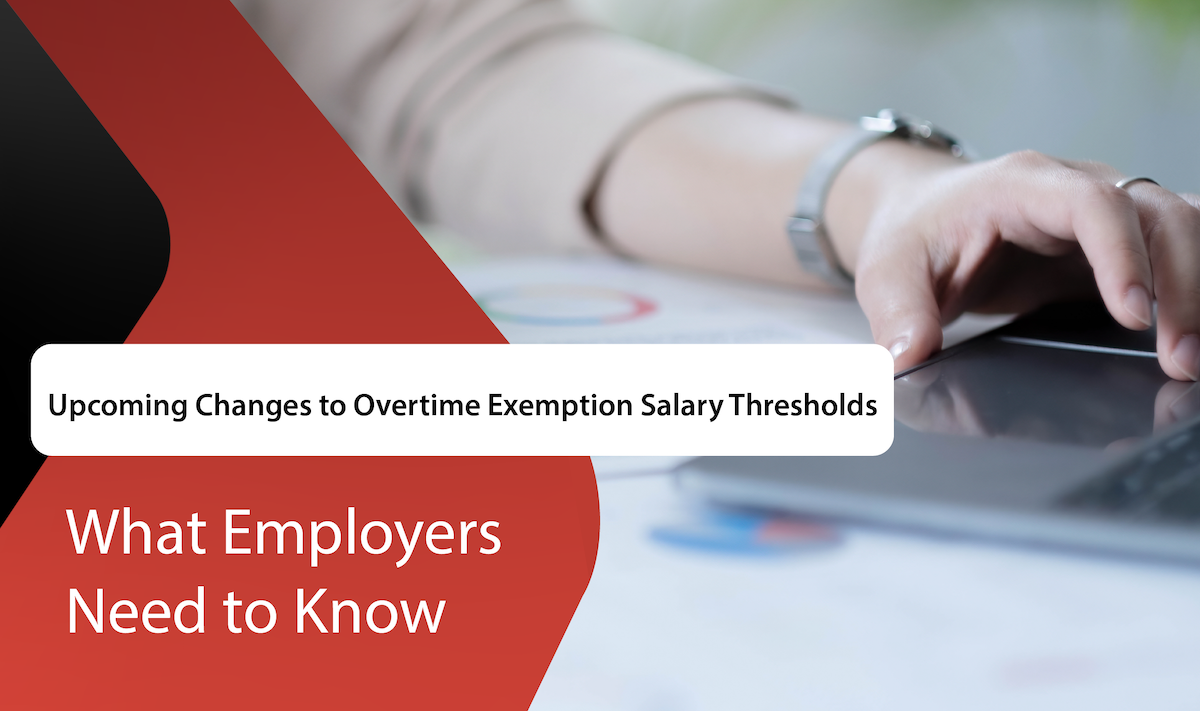
Navigating the Future of Work with Artificial Intelligence (AI)
May 13, 2024
Jaylerton Properties Case Study
June 5, 2024On July 1, 2024, the minimum salary threshold for exemption from overtime requirements will increase to $43,888 ($21.11 hourly, $844 weekly); on January 1, 2025, it will increase again to $58,656 ($28.20 hourly, $1,128 weekly). The salary thresholds will increase again on July 1, 2027, and there will be another increase every three years.
This means that employers should evaluate which of their currently exempt employees will be owed overtime under the new mandate whenever they work more than 40 hours in a work week and make decisions about budgeting for salary increases or overtime payments.
Under the Fair Labor Standards Act (FLSA), there are three tests that determine whether or not an employee is eligible for overtime.
- The Salary Level Test will increase the threshold for overtime exemption from the current level of $35,568 annually ($17.11 hourly, $684 weekly) on July 1, then again on January 1. Employees who are paid less than the new salary threshold must be paid overtime when they work more than 40 hours in a work week.
-
- Effective July 1, computer systems analysts, computer programmers, software engineers or other similarly skilled workers in the computer field must be paid $43,888 annually or, if paid hourly, at least $27.63 per hour in order to be exempt from overtime requirements. This annual salary threshold will increase to $58,656 on January 1.
- The Salary Basis Test – an exempt employee must be paid the same amount every pay period regardless of how many hours are actually worked.
- Any employee who is paid on an hourly basis is automatically NOT exempt from overtime.
- Sometimes exempt employees may work more than 40 hours in a workweek but sometimes they may work less than 40 hours. An exempt employee, for example, may take off a few hours on a workday to go to the dentist, but as long as the employee does not take off the entire day, there should be no adjustment to pay or requirement to use accrued leave.
- The Duties Test – exempt employees’ primary duties must be office or non-manual work that fall into one of the following categories:
- Executive – managing the company or a recognized department AND regularly supervising two or more employees; has responsibility for hiring, firing, and other employment actions (example: Chief Financial Officer)
- Administrative – primary duty involves managing part of the company’s business operations; exercises independent judgment and discretion (example: Human Resources Manager)
- Professional – intellectual work that requires advanced education or training (example: accountant)
- Computer professionals – primary responsibilities involve application and/or design of computer programs or related systems (see job titles above)
- Outside sales – primary duty must involve making sales or obtaining orders; regularly works away from place of business
In order to be exempt from the overtime requirement, an employee must satisfy all three tests.
Employers have two options:
- To maintain the exemption from the overtime requirement, increase the annual salary of currently exempt employees to the new mandatory federal threshold on or before July 1 (and again on or before January 1 which falls on a Wednesday so the change should be effective at the beginning of the pay period); OR
- Convert these employees to non-exempt status and pay overtime (1.5 times regular hourly rate) whenever they work more than 40 hours in a work week. The work week must be clearly designated in the employee handbook, for example: Monday 12:00 a.m. to Sunday 11:59 p.m.
An HR professional can help business owners navigate workplace challenges.
From hiring the right employees, running background checks, creating employee handbooks that include anti-harassment policies and procedures, and so much more, Next Level Solutions can work with you to provide the services that you need to run your business.
For more information about our accounting and human resource services, contact Next Level Solutions at in**@**********ol.net or (225) 330-8347.


